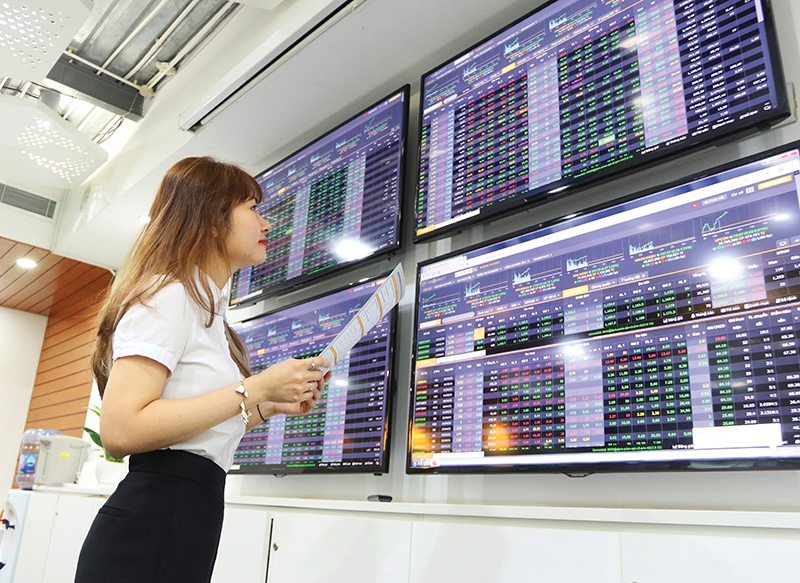Exchange-traded funds gain traction from overseas
 |
| The value of Vietnam’s stock market system has improved, partly due to proactive pandemic containment, photo Le Toan |
Last year saw a tremendous breakthrough in the Vietnamese stock market, as a series of records were broken. According to Fiintrade, a platform for traders in Vietnam’s stock market, foreign investors withdrew more than three times as much money from the three major bourses (Ho Chi Minh Stock Exchange, Hanoi Stock Exchange, and the Unlisted Public Company Market or UPCoM) in 2021 compared to the previous year, with net sold VND62.31 trillion ($2.71 billion).
Amidst overseas outflows, cash flow has been immersed in exchange-traded funds (ETFs) in the last year, with the majority of funds coming from overseas financiers. According to the State Securities Commission (SSC), ETFs trading on the Vietnamese market generated more than VND11.5 trillion ($500 million) in 2021.
Fubon FTSE Vietnam ETF, a newly launched ETF from Taiwan, has become the market’s most formidable fund, gathering around $417 million. Investors in Taiwan injected hundreds of millions of US dollars into the fund upon its inception, hoping that Vietnamese stocks would revive their prestige.
In October, ETF Bualuang Vietnam Equity Fund, commonly known as B-Vietnam, a subsidiary of Thailand-headquartered prominent fund Bualang Asset Management, filed for an initial public offering to capture Vietnam’s lucrative stock market, with a mobilised capital of approximately $50 million.
The Thai fund’s portfolio specialises in stocks that profit from the trend towards increased urbanisation, technical advancements, and foreign investment flows. Two exemplary cases include Vinamilk and FPT.
Vietnam’s regular stock updates are now available in the Thai language in the fund’s bulletin, demonstrating that Thai investors, like those in South Korea and China, are particularly interested in Vietnamese financial assets.
Peerapong Jiraseweejinda, managing director of Bualang Asset Management, highlighted the economic expansion and demographic features in Vietnam have contributed to the country’s prospects. “As a result of its proactive response to COVID-19, Vietnam’s stock market has seen its value rise steadily since 2020, drawing supply chain shifts from across the globe,” Jiraseweejinda said.
Positive flows
The flow of money across Vietnam continued to surge in 2021. As of December 10, money inflows into Vietnam totalled $295 million for the year, an increase of 60 per cent on-year. Vietnam was the only ASEAN market recording an upbeat flow of money.
The flow of money across Vietnam via major ETFs kept rising in 2021. As of December 10, total assets under management (AUM) reached $2.3 billion, two times higher than in 2020. Notably, the positive flow of money has spread to all major ETFs, as signalled by the increase of AUM of those ETFs.
Particularly, according to KIS Securities, the AUM of X-FTSE Vietnam, VFMVN30 ETF, VFMVN Diamond ETF, and SSIAM VNFIN Lead ETF doubled compared to 2020. Major ETFs recorded a positive flow of money (1 year accumulated), except for X FTSE Vietnam and VFMVN30 ETF.
“We expect a slight drop in the flow of money due to the maintenance of high demand for these ETFs. Domestic ETFs would continue to attract high demand whilst foreign ETFs could experience an outflow, especially Fubon FTSE Vietnam ETF and X FTSE Vietnam,” KIS added.
Despite its vast potential, Vietnam remains inaccessible to most foreign investors due to little or no ETF coverage or American Deposit Receipt listings, said Maurits Pot, founder and CEO of Dawn Global.
Dawn Global in June introduced its Asia-dedicated ETF Asia Growth Cubs, spanning across Bangladesh, Indonesia, Pakistan, the Philippines, and Vietnam.
| Market earnings for 2022-2023 growth are predicted to bode well for the VN-INDEX. VNDIRECT expects earnings of HSX-listed companies to grow 23 per cent on-year in 2022. Some sectors could see strong improvement in earnings growth, including Industrial goods and services, retail, and real estate, while performance of oil and gas, utilities, and technology remain relative strong. The market outlook in January 2022 is rather upbeat, underpinned by faster-than-expected recovery of Vietnam’s growth engines, including exports and foreign direct investment; a new financial stimulus package to be approved; and the valuation of Vietnam’s stock market looks attractive in a longer view. TheVN-INDEX is slated to fluctuate in the range of 1,480-1,580 points this month. Source: VNDIRECT |
Maturing system
In a broader context, Ho Chi Minh Securities Corporation reaffirmed their belief that ETFs could provide viable opportunities for overseas financiers penetrating into Vietnam’s equity market, despite the domestic landscape’s foreign ownership limit (FOL) ratio for listed companies.
“While non-voting depository receipts have not yet been adopted in Vietnam, ETFs also offer a premium-free approach to purchasing attractive stocks that reach their FOL,” Dragon Capital stated.
On the flip side, as the Vietnamese financial system matures and investment products become accessible, market watchdogs believe it is critical for consumers and institutional investors in Vietnam to have access to gold ETFs.
Andrew Naylor, regional CEO for Asia-Pacific (excluding China) and Public Policy at the World Gold Council, told VIR, “With gold ETFs, you may purchase and sell actual gold. This simply means that gold is much more liquid and a lot simpler to trade, and institutional investors in Vietnam may benefit from gold’s risk-mitigating and wealth-preserving qualities.”
On the other hand, additional economic support packages will help accelerate the recovery of Vietnam's economy in 2022, said Tran Khanh Hien, head of Research at VNDIRECT.
“The government will accelerate the reopening of Vietnam's economy, including aviation and tourism from the first quarter of 2022, which will reinforce investors' involvement in the equity sector. We also expect a stimulus package can be presented to the National Assembly and approved imminently. The size of the new additional stimulus package could be around 4.2 per cent of Vietnam’s GDP in 2021,” she noted.
The stimulus package is likely to include cash subsidies for people negatively affected by the ongoing pandemic, an interest rate compensation package for businesses, tax reductions for VAT and corporate income tax, and increased investment in transport and energy infrastructure.
| Yen Chen-Hui - Strategic director Yuanta Investment Consulting Taiwan
In our view, inflation is expected to rise in 2022, but investors should remain calm and avoid panicking over a recession. For individuals, it is vital to examine businesses with a concrete foundation for generating a steady stream of income. The substantial net selling by foreign investors in the Vietnamese market during the last two years is a reason for financial rebalancing, or portfolio balancing. Investors should only be concerned when foreigners continue their net selling in the context of a declining market. Furthermore, retail investors should refrain from tracking international transactions since foreign investors often lack market knowledge and are primarily keen on buying stocks of huge corporations, or blue-chips. Vietnam’s stock market is approaching the same magnitude as the market in Taiwan in 1988. Back then, that market saw a phenomenal expansion, increasing 12 times (in local currency) between the 1985-1990 period, for some reasons that are comparable to those that exist in Vietnam at the moment. The increasing number of young people is growing their appetite for the equity market, and the number of wealthy people is soaring. Credit expansion is bolstered by low lending interest rates. Furthermore, domestic investors believe that the local currency will rise in value as a result of years of rapid growth in GDP and a current account surplus. The stock market, likewise, is increasingly attracting the attention of the younger demographic, and the number of people who can afford to pour their money into risky portfolios there is also rising. There is a cultural predisposition to placing bets on the stock market, which all contributes to a boost in stock market liquidity. |
What the stars mean:
★ Poor ★ ★ Promising ★★★ Good ★★★★ Very good ★★★★★ Exceptional
Related Contents
Latest News
More News
- Cashless payments hit 28 times GDP in 2025 (February 04, 2026 | 18:09)
- SSIAM and DBJ launch Japan Vietnam Capital Fund (February 04, 2026 | 15:57)
- Banks target stronger profits, credit growth in 2026 (February 04, 2026 | 15:43)
- Vietnam on path to investment-grade rating (February 03, 2026 | 13:07)
- Consumer finance sector posts sharp profit growth (February 03, 2026 | 13:05)
- Insurance market building the next chapter of protection (February 02, 2026 | 11:16)
- NAB Innovation Centre underscores Vietnam’s appeal for tech investment (January 30, 2026 | 11:16)
- Vietnam strengthens public debt management with World Bank and IMF (January 30, 2026 | 11:00)
- Corporate bond market poised for stronger growth cycle (January 28, 2026 | 17:13)
- Vietnam's IPO market on recovery trajectory (January 28, 2026 | 17:04)


 Tag:
Tag:




















 Mobile Version
Mobile Version